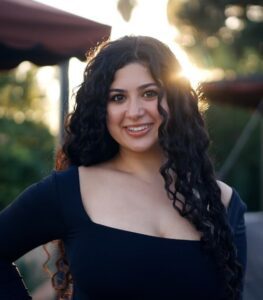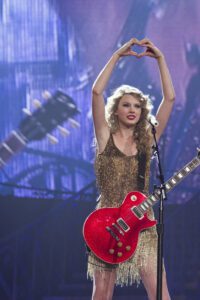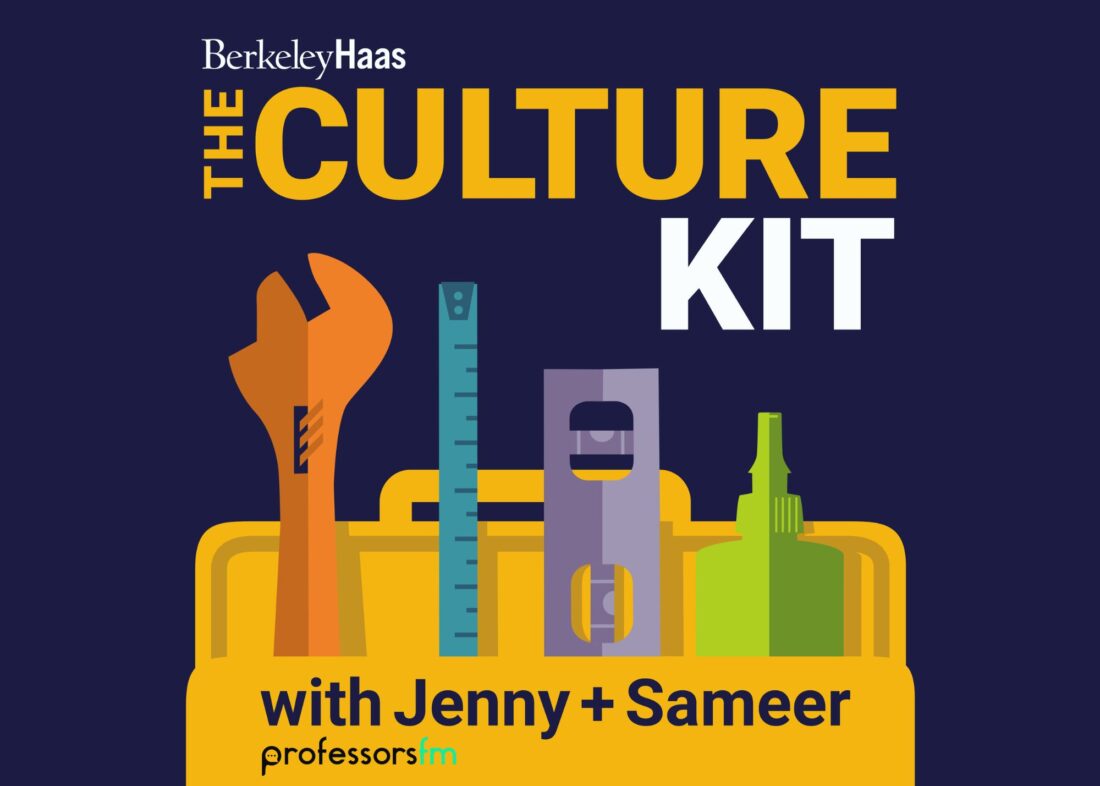Brain scans help researchers untangle the truth about lie detection

Miaad Madeline Bushala, BS 25, co-teaches a DeCal on Taylor Swift.
Miaad Madeline Bushala, BS 25, likes Taylor Swift’s music but doesn’t consider herself a die-hard “Swiftie.” What’s more intriguing to her is Taylor Swift’s evolution as a business leader who continues to top the music industry.
Bushala is now tapping into how the 14-time Grammy winner built her fortune, co-teaching a DeCal at Berkeley Haas called “Artistry & Entrepreneurship: Taylor’s Version” with Sofia Mei Lendahl, a sophomore Data Science and Statistics double major. The pair were in their fourth week of teaching the 13-week class when Bushala talked to Haas News.
You came to this class with both a musical and a business background.
Indeed, I did. I was a vocalist in the Popular Music Conservatory at the Orange County School of the Arts (OCSA) alongside my brother who is a fantastic drummer and my biggest musical inspiration. I attended Grammy Camp twice for vocal performance, a camp where high school students across the nation learn from and collaborate with music professionals.
My business background comes from watching and helping my parents with their real estate business, and then of course all that I’ve learned since being a student at Haas.
What interested you most about Taylor from a business perspective?
I heard somebody say that “nothing about Taylor Swift is an accident,” and I truly do believe that. Particularly as a business student, Taylor’s story has been so fascinating to me. At the end of the day, her songs, albums, merchandise, tours, etc. are all products, and for a product to have a life of almost 20 years not only says something about Taylor’s brilliance as an artist, but as a businesswoman. With that, I am interested in unraveling all those pieces about her and seeing what made her the success that she’s become.
I heard somebody say that “nothing about Taylor Swift is an accident,” and I truly do believe that.
How did you meet Crystal Haryanto, BA 23 (Economics, Cognitive Science, & Public Policy), who founded this class?
Crystal and I met through Lizzie Coyle, director of Major Gifts at Haas. Lizzie shared the excitement of the Taylor Swift course in the business school and I was encouraged to consider joining the team as the team was also seeking a business perspective. I was supposed to study abroad this semester in Spain, but this was my sign to stay and do something that I’d never done before.
As a business student, how did you help shape the class syllabus?

Singer Taylor Swift (AP Photo/Nati Harnik)
I asked the hard questions—for every concept in our syllabus, I ensured that there was a viable link to business. We wanted students to view Taylor as an entrepreneur who differentiates herself within a market, manages customer acquisition and sustains customer loyalty, and impacts multiple economies. We wanted them to think about how, as future entrepreneurs and business leaders, to make their customers their biggest fans, like Taylor has done.
Can you give a few examples of how that plays out weekly in the class?
One of my ideas for our marketing unit was a deep dive into Taylor’s style evolution over her self-proclaimed eras, and how that has reinforced her principles of relatability and world building. While style was a more subtle signal that built up over time, I’ve also enjoyed speaking about her direct power moves. Last night, for instance, we discussed how Taylor negotiated her contract with AMC Theatres and took hold of the reins for the Eras Tour film project. She financed the film and received 57% of the movie profits. To me, that was her learning from the mistake she made when she was younger, when she signed over the masters to her music.
In business school, students study the importance of connection in building an authentic brand. How has Taylor become a master at that?
Taylor’s songwriting stands out on two primary levels. The first is that she puts her insecurities and struggles out there, emotionally stripping herself through art. The second is that she vividly weaves those vulnerabilities into stories. Unique structures, sonic devices, and figurative language add layered complexities to these stories that ensure that they are highly talked about among consumers as a hot commodity. These elements of songwriting craft also tailor each product to match the message it is sending, which strengthens its value to consumers. She’s able to create a dynamic, so people continue to feel like they can relate to her. She really knows her audience, and her songs cover every part of her ideal listener’s life.
What does Taylor teach us about how to lead?
Taylor’s grandmother, Marjorie, said it best: “Never be so kind, you forget to be clever / Never be so clever, you forget to be kind.”
Taylor shows us how to balance a good heart with strategic design. We bring it up in class—the bonuses that she gives her team and the ways that she gives back to the community. Philanthropy happens to also be a tax write off for her, but that isn’t a bad thing. I think people know when a brand is doing something that feels inauthentic, and that isn’t the case with Taylor.
I think people know when a brand is doing something that feels inauthentic, and that isn’t the case with Taylor.
Taylor has so much power. How do you see her using it to uplift women’s voices, big and small?
Taylor has spoken extensively on how navigating the industry as a woman is different than as a man, which she writes about in “The Man” and “mad woman.”
She wears clothes from small, women-owned businesses, which have seen huge jumps in customers and traction.
But arguably one of the biggest ways that Taylor has amplified women’s voices is when she was a victim of sexual assault and ended up suing her assaulter for a symbolic one dollar. For many women, especially young fans, hearing a beloved figure speak so openly about that emotional damage not only acknowledges their pain, but also models speaking out against intolerable behavior that has become normalized in our society.
I have to ask about her dating Travis Kelce and what that has done for her brand.
The question should be what dating Taylor Swift has done for Travis Kelce’s brand. We’ll discuss her influence in the NFL in class and perhaps the perceptions that come with being in a high-profile relationship.
How much longer do you think that Taylor will continue reinventing herself as an artist? Do you think she will be like Madonna, touring in her 60s?
A lot of artists, once they feel like they’ve reached a certain point, go off the grid. I don’t quite know, but I know this: Taylor will always be a songwriter. She’s even said that she would consider writing songs for other people at some point. She cites songwriting as her lifeline, passion, and purpose—singing and performing are extensions of that.
Note: Bushala and her team will present at the annual Berkeley Haas Alumni Conference on April 27. Registration is open.
Posted in:
Topics:


